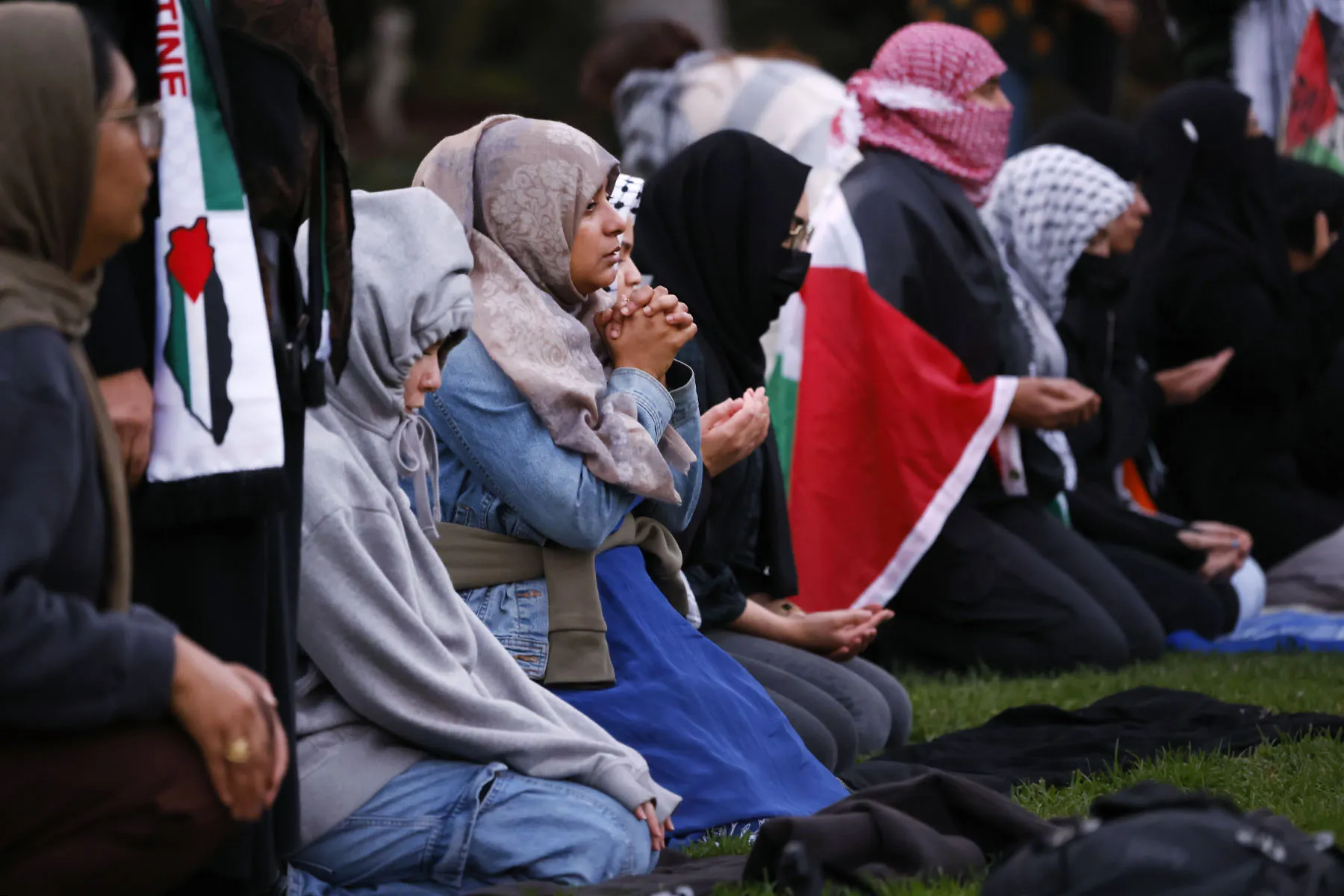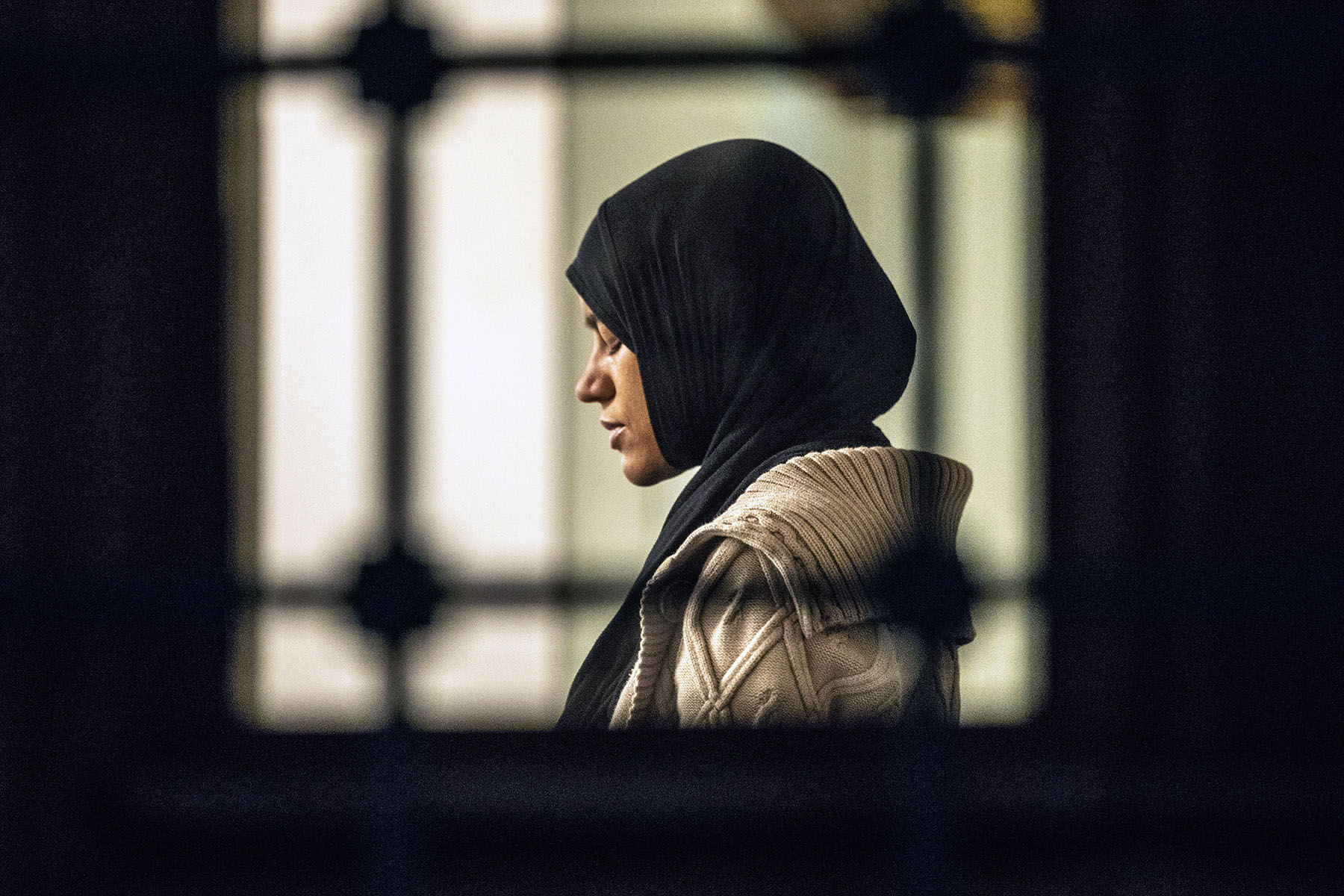When Tamera Hutcherson was arrested on January 8 in Dallas, she says, she was ordered by a woman officer to remove her headscarf and lift up her shirt with the instruction: “Lift up your top like it’s Girls Gone Wild.” When she did, her waist beads — worn as part of a deeply-held spiritual belief — were revealed, and the officer allowed her to continue wearing them.
But then, she says in a new lawsuit, she was escorted to take a mugshot. Another officer, a man, ordered her to remove her headscarf again, this time in view of both men officers and inmates. She tried to explain that she wore her head covering for religious reasons but was ignored. Hutcherson eventually complied but was shaking and crying so violently that the photograph had to be taken three times just to capture an in-focus image.
Hutcherson was arrested alongside two other women wearing hijabs that day — Donia El-Hussain and Nidaa Lafi — after participating in a protest demanding that the Biden administration call for an immediate cease-fire in Gaza. The three women have filed a civil lawsuit against Dallas County, the Dallas County Sheriff’s Office and the individual officers involved, saying their religious garments were unlawfully removed for mugshot photos. The Dallas County Sheriff’s Office did not immediately respond to a request for comment.
Huma Yasin, the lawyer representing El-Hussain, Hutcherson and Lafi, said she hopes this legal action prompts policy changes.
“We’re not going to sit here when my clients have been violated in a very profound way and just roll over,” Yasin said. “The Dallas-Fort Worth area is home to so many religions, not just Muslims. We have a very diverse population, and for religious liberties to be curtailed in this manner is frankly unacceptable.”
The federal Religious Land Use and Institutionalized Persons Act, established in 2000, says the government can’t “impose a substantial burden on the religious exercise of a person residing in or confined to an institution.” But its interpretation varies across jurisdictions when it comes to religious head coverings.
Yasin said it’s not clear how many people have been forced to remove religious head coverings when in custody.
“As a society, there are a myriad of ways that people are discriminated against, and some are very obvious and some are more obscure,” Yasin said. “We need to be vigilant to make sure that every person in our community is protected equally.”
According to the complaint, Hutcherson, El-Hussain and Lafi continue to suffer mental anguish, physical and emotional distress, humiliation and embarrassment. El-Hussain and Lafi initially refused to remove their head scarves but eventually complied because they believed they would be forcibly strip searched and detained for several days otherwise. Both began crying and were visibly shaken during their respective mugshots, which occurred in a common area visible to all officers, detainees and anyone passing. The women’s mugshots appeared on NBC News and were made available to multiple agencies.
“I wear a hijab myself,” Yasin said, referring to a religious head covering worn by many Muslim women. “We have passport pictures, driver’s licenses, and I am not mandated to take it off. You’re telling me that this small misdemeanor offense requires [my clients] to remove their hijabs? That’s crazy.”
Yasin said she has not heard anything from Dallas County, six weeks after she sent a letter to the sheriff’s office providing notice that a lawsuit was coming. Now, a jury may determine the outcome.
These three women in Dallas are the latest to sue the government after being forced to remove their hijabs, claiming a violation to religious exercise. In the past decade, similar lawsuits have been filed in New York City, Los Angeles, Miami and other municipalities.

The Council on American-Islamic Relations, the largest Muslim civil liberties organization in the country, condemned a separate incident in March in which police officers in the Dallas-Fort Worth area forcibly removed protesters’ hijabs. A statement was released after more than a dozen protesters were arrested for blocking the entrances to a General Dynamics facility in Garland, Texas, that produces bombs that the protesters believe will be used in the Israel-Hamas war.
“By allegedly forcibly removing the hijabs of the female protesters, Garland police violated their fundamental right to religious liberty,” Mustafaa Caroll, the executive director of CAIR Dallas-Fort Worth chapter, said in the statement. “We call on law enforcement authorities to allow the protesters to retake their photos with their hijabs and to delete the photos without them. No American should have their First Amendment rights violated while seeking to end support for genocide.”
CAIR’s national office offers educational booklets — including “A Correctional Institution’s Guide to Islamic Religious Practices” and “A Law Enforcement Official’s Guide to the Muslim Community” — to help law enforcement authorities gain a better understanding of Islam and Muslims.
The cases filed in the past decade have largely resulted in settlements. One lawsuit in New York, filed by Jamila Clark and Arwa Aziz, led to a New York Police Department policy change as part of the settlement agreement. As of 2020, the city’s police force no longer removes hijabs or other religious head coverings for mugshots as long as faces remain unobstructed. Clark and Aziz were arrested separately in 2017 — one in January and the other in August — but endured similar experiences at the hands of New York City police officers. Both were taken into custody on low-level charges of violating orders of protection that were later dismissed.
In 2017, the City of Long Beach in California agreed to pay a $85,000 settlement after a federal lawsuit was filed by Kirsty Powell, an African-American Muslim whose hijab was pulled off by a man officer while she was in police custody. As a result of Powell’s 2016 lawsuit, the Long Beach Police Department reversed its policy barring detainees from wearing religious head coverings. And if it is “necessary for officer safety,” a woman officer is now required to remove an inmate’s hijab outside the presence of men officers and detainees.
Aida Shyef Al-Kadi, another Muslim woman in Minnesota, received $120,000 in 2019 to settle her lawsuit alleging her hijab was forcibly removed for a booking photo related to a traffic offense. The settlement came more than six years after her arrest, which she described as “one of the most humiliating and harmful experiences” of her life. As part of the settlement agreement, Ramsey County jail put in new rules that made it so detainees would never be forced to remove hijabs in front of men. The county also agreed to destroy all hard and electronic copies of Al-Kadi’s booking photo.
And last year, Sophia Johnston was forced to take off her hijab when she was arrested and booked into the main jail in Rutherford County, Tennessee. She was forced to take off her headscarf in front of five men — an experience which “scarred her emotionally,” according to a lawsuit she filed against the county, the sheriff and three officers. Prior to her arrest, no man outside her family had seen her hair since childhood. In a settlement, the county agreed to pay Johnston $100,000 and destroy her mugshots and changed its booking policy in January.
Yasin said this issue of law enforcement policy and religious liberty impacts more than just Muslim women. It may also be impacting Catholic clergy who sometimes wear veils, Jewish people who might cover their heads with yarmulke or tichel, and Sikhs who wear turbans — all for religious reasons. Still, she said it’s hard to know the true scope of the problem — or say whether there will be a widespread policy change among law enforcement agencies across the country.
“Bureaucracies tend to move slowly,” Yasin said. “It’s the nature of government. That’s not necessarily malicious, but in a place like Dallas County where we have such a diverse population, it’s frankly surprising that they do not have any kind of policy around respecting religious liberty.”







